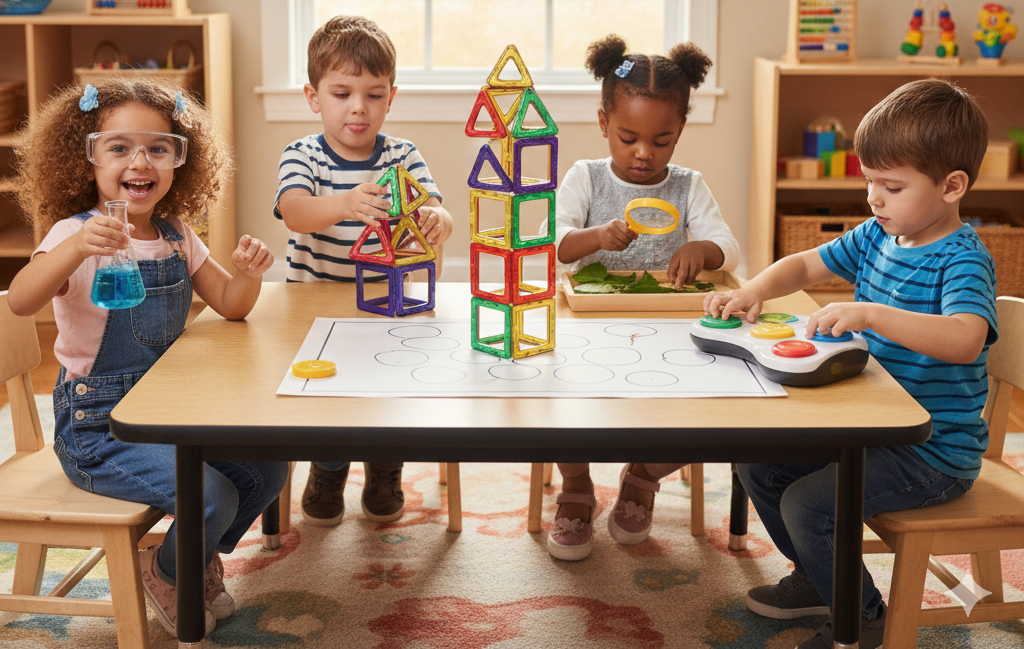When we are closely looking at the Preschool kids, we can see they are little scientists. They ask a lot of questions from parents, relatives and teachers, and you can see kids are trying out new ideas, and learn through play. That’s why STEM activities (Science, Technology, Engineering, and Math) are good for this stage.
In this article, the main goal is not to teach advanced concepts of science; it’s about exploration, curiosity, and discovery. With simple materials you already have at home or in the classroom, you can create meaningful learning experiences that build a foundation for future scientists.
Here are five detailed STEM activities for preschoolers, complete with steps, variations, and learning outcomes.

1. Building Towers using Blocks
- What we needed: Wooden blocks, DUPLO, LEGO, cardboard tubes, or boxes.
- Steps:
- First, ask children to build the tallest tower possible.
- Then encourage them to notice what makes a tower stable (wide base, balance, strong foundation).
- After that, tell them to rebuild the tower after it falls.
- Variation: Use marshmallows and toothpicks or spaghetti and playdough for a new twist.
- Learning Skills: Engineering principles, balance, spatial awareness, persistence, and teamwork.
💡 Teacher Tip: Ask: “What could we change to make it stronger?”
2. Sink or Float Experiment
- What we needed for this activity: a large tub of water, small objects (toy car, cork, sponge, plastic spoon, stone, crayon).
- Steps:
- First, lay out the objects and let children guess: Will it sink or float?
- Then, test each one in the water.
- Sort into two piles: “sinkers” and “floaters.”
- Variation: Add food colouring or soap for fun, or test fruit (orange with peel vs. without peel).
- Learning Skills: Scientific method (predict → test → observe → conclude), buoyancy, cause and effect.
💡 Teacher Tip: Record predictions on a simple chart so kids can compare results.
3. DIY Bridges with Straws and Tape
- What we needed: Straws, masking tape, toy cars, and books to create “gaps.”
- Steps:
- First, place two books a few inches apart.
- Then challenge kids to build a bridge using straws and tape.
- Test if the bridge can hold a toy car.
- Variation: Use popsicle sticks, cardboard strips, or playdough as connectors.
- Learning Skills: Engineering design, testing and revising, problem-solving.
💡 Teacher Tip: Don’t solve the problem for them, guide with prompts like “What if we added another straw here?”
4. Counting on Nature
- What we needed: Rocks, pinecones, shells, leaves (collected outdoors).
- Steps:
- First, collect the needed items on a walk.
- Then sort by size, shape, or colour.
- After that, count in groups of 5s or 10s for early math.
- Variation: Create patterns (rock-leaf-rock-leaf) or simple addition (2 rocks + 3 rocks = ?).
- Learning Skills: Counting, sorting, comparing, pattern recognition, and basic math.
💡 Parent Tip: Turn it into a nature scavenger hunt—“Find 5 sticks!”
5. Simple Volcano Eruption
- What we needed: Baking soda, vinegar, food colouring, a small plastic cup or bottle, and a tray to catch spills.
- Steps:
- First, place baking soda in the cup.
- Then add a few drops of food colouring.
- After that, pour vinegar and watch the eruption.
- Variation: Use glitter for a “sparkly volcano” or mould playdough around the cup to make it look like a real mountain.
- Learning Skills: Chemistry basics (acid + base reaction), observation, cause and effect.
💡 Safety Tip: Always supervise—remind kids not to taste the materials.
Weekly Plan: STEM Activities for Preschool
Day 1 – Monday: Science
Activity: Sink or Float Experiment
- Check if items will sink or float.
- Test in water and record results.
- Skills: Observation, prediction, critical thinking.
Day 2 – Tuesday: Technology (Early Problem-Solving)
Activity: Pattern Play with Beads or Buttons
- Create colour or shape patterns (red-blue-red-blue).
- Extend patterns or invent new ones.
- Skills: Sequencing, logic, and early coding concepts.
Day 3 – Wednesday: Engineering
Activity: Straw & Tape Bridges
- Build bridges between two chairs/books.
- Test with toy cars or small objects.
- Skills: Design, trial-and-error, teamwork.
Day 4 – Thursday: Math
Activity: Counting with Nature
- Collect rocks, leaves, or sticks.
- Count, sort, and compare sizes.
- Try simple addition (“2 rocks + 3 rocks = ?”).
- Skills: Counting, grouping, comparing.
Day 5 – Friday: Science & Fun Wrap-Up
Activity: Mini Volcano Eruption
- Mix baking soda, vinegar, and food colouring.
- Watch the fizzing reaction.
- Skills: Cause and effect, early chemistry, excitement in learning.

